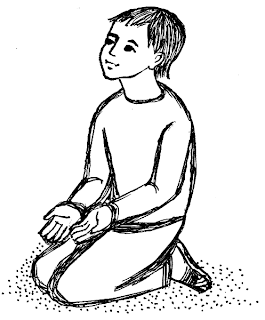The torment that Stephen experiences towards
the end of Chapter 3 is difficult to interpret, but this confusion that the
reader experiences (or at least that I experienced) in interpreting this section
stems from the contradictions present in Stephen's tortured suffering. To begin with, Joyce does not, for the most
part, provide the reader with any traditional sense of time. He even writes at one point, “Time passed,”
which does not help to orient the reader in the least. However, this disappearance of time reflects
the consuming nature of Stephen’s pain.
He himself is no longer conscious of earthly time. Instead, and this is hard to articulate, he
becomes aware only of a sort of “spiritual time,” if you will, meaning he
envisions himself as being in the world of his soul. He is able to feel physically the pain of
hell gnawing at his flesh, as he fearfully considers the sinfulness of his own
soul and the arrival of the Last Judgment.
While on the surface Stephen’s
suffering may seem melodramatic, I do think that his spiritual torment is
genuine. Through his artistic
sensitivity, he sincerely feels hell eating away at both his body and soul
because he considers his sinful self to be irreconcilably removed from God and
the Virgin Mary. However, that is not to
say that Stephen’s suffering is not without flaws. As Justin points, his torment is bizarrely
self-centered. For example, Stephen
views himself as being responsible for corrupting Emma’s innocence. He has such an aggrandized sense of
self-importance and of his own supposed martyrdom that he obliviously believes his own lustfulness affects the
eternal well-being of those around him.
Furthermore, Joyce mocks the selfish nature of Stephen’s suffering by
highlighting the contradictions in his view towards women. Stephen has the utmost reverence for the Virgin
Mary, and he aspires to experience Mary’s divine purity. Just as he surrenders himself to her grace
and holiness, he likewise surrenders himself to the prostitute, seeking to
discover himself in her. Although
Stephen notices that the lips with which he praises Mary were also used to kiss
a prostitute, he does not make the connection that he is ultimately using them
for the same purpose. He seeks to escape
to a higher order through both Mary and the prostitutes, but he continues to
idealize Mary while objectifying the prostitutes.
Lastly, it seems as if Stephen’s
struggles stem from his inability to reconcile his Catholic and artistic
urgings. It has become clear that he is
different than other teenagers and that he has an artistic sensibility. The artist in him seeks to experience the
world and to act upon his extreme emotions and desires, which is ultimately why
he fulfills his sexual urgings with prostitutes. However, at the same time, his intensity of
feeling, which appears to be the origin of his lustfulness, is what also
prompts him to subject himself to such tormented self-condemnation. Is this a reasonable proposal? Is the cause of Stephen’s spiritual crisis
his inability to reconcile the artistic and religious sides of his
character? And, if this is true, is the
rest of the novel going to center on Stephen’s choosing one of the two or attempting
to join these two sides?



